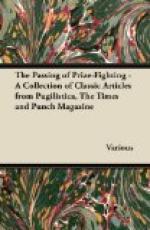Worse still, when he returned to earth after a lapse of fourteen years’ purgatory (between the sixth and seventh scenes), for his record was a rotten one and he had shown no signs of penitence, the revenant made very poor use of his hour. Returning to his wife whom he had brutalised, he found that she had taught their girl-child to regard him as a paragon of virtue, and most of his limited time was spent in correcting this beautiful legend. You see, at the time of his death he had had no chance of making the child realise how bad he was, for the excellent reason that she had not yet been born, so he seized this opportunity of making good that omission.
As a practical illustration of the kind of man he really had been, he struck the child violently on the arm. We all saw him do it and we all heard the smack, but the child assured us that she had not felt anything. This I suppose was the author’s way, ingenuous enough, of reminding us that it was a case of spirit and not of flesh, whatever our eyes and ears might persuade us to think of it.
Already in a previous scene there had been the same old difficulty. While the man lay dead on his bed his spirit had been summoned by a Higher Power (indicated in a peep-show), and his corpse sat up, displacing the prostrate form of the widow, who had to take up a new position, without however appearing to notice anything. It was still sitting up when the curtain fell, and incidentally was caught in the act of resuming its recumbent position when the curtain rose again for the purpose of allowing the actors to receive our respectful plaudits.
Behind me I heard an American lady suggest that if they could somehow distinguish the spirit from the body it would be better for our illusions. To which her neighbour expressed the opinion that they would eventually manage to do that feat. I await, less hopefully, this development in stage mechanism. Meanwhile Mary Rose has much to answer for.
The play began promisingly enough with a scene full of colour and humanity, of humour and pathos. We were among the roundabouts, whose florid and buxom manageress, Mrs. Muscat (admirably played by Miss SUZANNE SHELDON), was having a quarrel of jealousy with her assistant and late lover, “The Daisy,” who had been seen taking notice of Another. The dumb devotion of this child, Julia (Miss MARY MERRALL), who could never find words for her love—she said little beyond “Yuss” and “I dunno”—was a very moving thing; and the patient stillness with which she bore his subsequent brutality held us always under a strange fascination.
[Illustration: “The Daisy” (Mr. CAINE). “WHAT MADE YOU TAKE A FANCY TO ME?”
Julia (Miss MERRALL). “I DUNNO.”
(Sympathetic appreciation of her ignorance on part of audience.)]
For the rest it was an ugly and sordid business, relieved only by the coy confidences of the amorous Maria (played by Miss GLADYS GORDON with a nice sense of fun). Mr. HENRY CAINE, as “The Daisy,” presented very effectively the rough-and-ready humour and the frank brutality of his type; but he perhaps failed to convey the devastating attractions which he was alleged to have for the frail sex; and his sudden spasms of tragic emotion seemed a little out of the picture.




